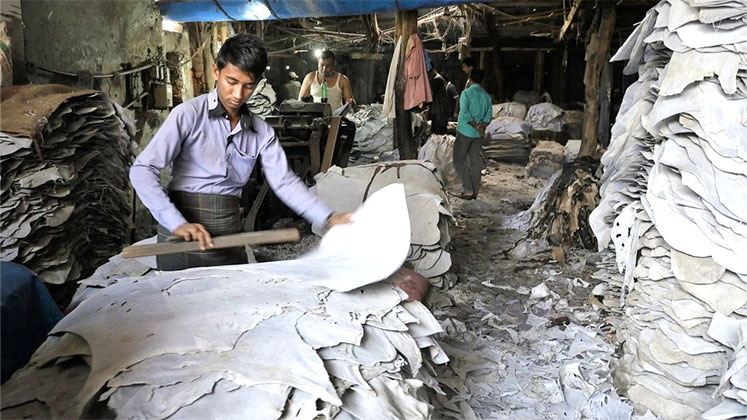Growing instability is gripping Bangladesh’s leather and tannery sector as delays continue in implementing the newly revised minimum wage, despite the official gazette being issued on 21st November. The Tannery Workers Union has warned that employer inaction—combined with layoffs, contractual hiring practices, and the government’s reported plan to place the Savar Leather Industrial Estate under the Bangladesh Export Processing Zones Authority (BEPZA)—is creating deep uncertainty across the industry.
At an event, the union’s President, Abul Kalam Azad, said that nearly two years of negotiations and tripartite discussions had led to “no meaningful progress” on wage execution, leaving thousands of workers in limbo. He alleged that some factories were classifying long-serving workers as “temporary” to bypass the revised wage, a practice he characterised as a direct breach of labour law.
Union General Secretary Abdul Maleque said that factories were also delaying renewal of the bilateral agreement that typically follows a Wage Board decision, a move he argued was pushing other worker benefits into uncertainty. He added that reports of layoffs of skilled machinists—replaced by contract labour often without legal compensation—were widening mistrust between workers and employers.
Concerns have intensified following media reports that a high-level committee has recommended shifting management of the Savar Leather Industrial Estate from the Bangladesh Small and Cottage Industries Corporation (BSCIC) to BEPZA, reportedly to strengthen environmental compliance and revive export competitiveness in Bangladesh’s US $ 1.2 billion leather industry. The union has stated it was not officially consulted and fears that BEPZA’s more restrictive union environment could erode worker rights.
Industry observers say the timing is particularly sensitive. Bangladesh’s leather exports experienced modest recovery in 2025 due to improved global demand, rising orders from South Korea and Japan, and new compliance-linked incentives. However, they caution that ongoing instability risks undermining this momentum if wage disputes escalate or restructuring proceeds without strong social dialogue.
AKM Nasim, Country Programme Director at the Solidarity Center’s Bangladesh Office, said that employers’ reluctance to implement gazetted wages, along with weak government oversight, was “alarming.” He noted that labour law guarantees equal wages for permanent, temporary, and contractual workers, yet implementation remains inconsistent—particularly for temporary workers in Dhaka and for women workers in Chattogram. He also warned that placing the sector under BEPZA could significantly restrict freedom of association at a time when ongoing labour reforms already cap the number of unions within an enterprise cluster at five.
Syed Sultan Uddin Ahmmed, Chief of the Labour Reform Commission, said that continued delays and the long-standing practice of keeping workers in temporary status were eroding trust. Such instability, he argued, would ultimately weaken the industry’s foundation and harm national economic interests.
As tensions intensify, stakeholders agree that coordinated action from employers and the state is essential to restoring confidence and ensuring a smooth transition, especially as Bangladesh seeks to strengthen its position in the global leather value chain.







